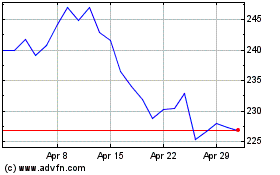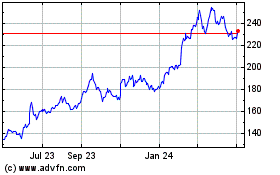By William Boston
This article is being republished as part of our daily
reproduction of WSJ.com articles that also appeared in the U.S.
print edition of The Wall Street Journal (May 1, 2018).
BEIJING -- Volkswagen AG and ride-hailing giant Didi Chuxing
said Monday they are closing in on a joint venture to share
technology and develop mobility services in China.
The deal, which could be announced early next week, would mark
the first step for a potential broader alliance between the world's
biggest auto maker by sales and the global leader in ride-hailing,
as China races to get ahead in mobility services such as car
sharing.
It is also highlights that even as China begins to loosen
requirements on joint ventures, foreign manufacturers are wary of
going it alone and want a strong local partner to boost their
chances of success in the country.
"The joint venture with Didi is not just about ride-hailing. We
want to explore mobility projects as well as autonomous driving and
robo-taxis," said Weiming Soh, board member in charge of strategy
at Volkswagen's China subsidiary.
A spokeswoman for Didi said: "The parties are still exploring
details of the cooperation. Potentially, both parties will focus on
building together a fleet operation business, and look into other
potential areas such as designing new car models for
ride-hailing."
As a first step in the joint venture with Didi, Volkswagen has
agreed to provide around 100,000 vehicles, plus electric and
autonomous-vehicle technology, and manage the fleet of vehicles.
Volkswagen won't be the venture's exclusive provider of vehicles,
but Mr. Soh said the company would be Didi's sole equity partner in
the venture.
Initially, Volkswagen would hold 40% in the venture and acquire
another 10% at a later date to give the two partners equal
stakes.
Didi's business with its ride-hailing app would remain outside
the venture, but it is eager to tap Volkswagen's experience in
fleet management.
Didi, the largest ride-hailing company in the biggest auto
market by sales, has global ambitions and has begun reaching out to
car manufacturers to help it expand.
Didi announced a separate global undertaking last week with 31
auto makers including Volkswagen, Toyota Motor Corp. and the
three-way alliance of Renault SA, Nissan Motor Co. and Mitsubishi
Motors Corp. Didi is inviting auto makers to jointly develop
affordable electric vehicles for China, but some car makers said
they had yet to commit to the project.
"China could play a pivotal role in transforming the existing
automotive and transportation structure that has been in place for
over 100 years," Didi Chief Executive Cheng Wei told reporters last
week in Beijing.
Didi recently launched operations in Mexico, the first time it
has offered services under its own name outside of China.
Initially, it will operate in Toluca, which is about 40 miles west
of Mexico City, with plans to expand to other cities in the
country.
Volkswagen CEO Herbert Diess told reporters last week that the
German auto maker would invest around EUR15 billion ($18 billion)
in electric cars, autonomous driving, business digitization and new
mobility services in China, as part of a global push to spend EUR34
billion on new technology. Mr. Diess took control of Volkswagen in
April after his predecessor, Matthias Müller, was pushed out.
The two companies have been in discussions for more than a year.
In late 2016, they said they were discussing setting up a high-end
ride-hailing service. And about a year ago, the companies
considered the idea of the German auto maker taking a stake in
Didi, Mr. Soh said. When Volkswagen rejected the idea, the two
sides decided instead to create a joint venture.
Foreign companies have made few inroads into China's
ride-hailing and car-sharing markets. In 2016, Uber Technologies
Inc., the biggest ride-hailing service in the U.S., threw in the
towel, shutting down its service in China and taking an 18% stake
in Didi, which also became a minority shareholder in Uber.
Volkswagen owns an undisclosed stake in Gett, the Israel-based
ride-hailing service, which is focused on Europe and the U.S. But
Volkswagen officials, citing Uber's failure, said it was necessary
to have a local partner to be a mobility player in China.
In the country, Volkswagen also has a car-sharing venture with
Shouqi, a state-owned provider. Shouqi offers services in 23 cities
in China and aims to expand to 40 cities. Volkswagen holds a 20%
stake in the company and provides management support. Volkswagen's
electric-car venture with JAC is providing Shouqi with 7,000
vehicles.
Mr. Soh said Volkswagen was also in talks with potential
partners about creating a luxury ride-hailing service and building
charging stations for electric vehicles. He wouldn't provide any
details about those talks or the potential partners.
--Yoko Kubota in Beijing contributed to this article
Write to William Boston at william.boston@wsj.com
(END) Dow Jones Newswires
May 01, 2018 02:47 ET (06:47 GMT)
Copyright (c) 2018 Dow Jones & Company, Inc.
Toyota Motor (NYSE:TM)
Historical Stock Chart
From Jun 2024 to Jul 2024

Toyota Motor (NYSE:TM)
Historical Stock Chart
From Jul 2023 to Jul 2024
